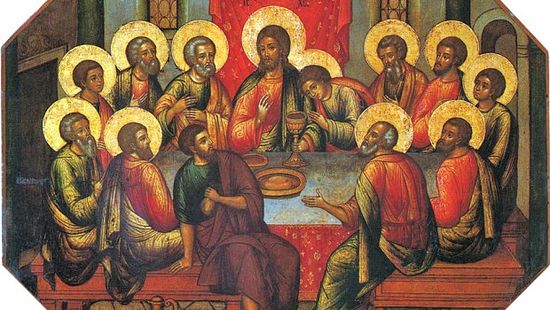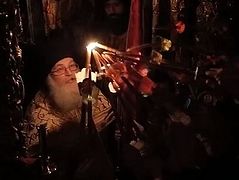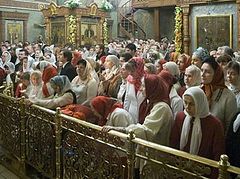Source: Orthodox Christian Network
May 15, 2016
Χριστὸς ἀνέστη! Christ is risen! Natural catastrophes and personal tragedies, not uncommon in our complex and fallen world, are simultaneously indicative and derivative of our fallen existence. Orthodox soteriology, always cognizant of the imperfect world in which we live, makes insightful references to salvation as man’s restoration to perfect communion with God and nature’s “re-creation” (ἀνάπλασις) by God to the blessed pristine state known before the Fall. In both cases, salvation may be defined as a twofold process involving: (1) the return of man to God via the privilege of genuine repentance, which naturally triggers (2) God’s sanctification of the once profane creation, another way of saying that God’s grace fully permeates and, as it were, reclaims that which was intentionally His in the first place.
The Resurrection, in all its splendid grandeur and central significance for the Church (cf. 1 Corinthians 15.14), marks the very critical point where this long-awaited transformation occurs. It is the power of Christ’s resurrection that confronts us with the prime significance of self-examination and conformity to a life of unending hope in and love for the Lord God. The paschal doxastikonmakes it abundantly clear that personal reformation and reconciliation for the Christian must be rooted in the Resurrection, which is the ultimate scale by which the human conscience is judged: “And toward those who hate us let us forgive everything through the Resurrection.”
All complex theorizing aside, without the sensitive transformation of hearts and wills over to God, our technologically advanced world may seem to be making progress on several fronts, but not in the area of mere humanity, which can only discover its absolute fulfillment, its raison d’être, within the context of its relationship to its divine Source. Twenty-first century mankind has many wonderful achievements of which to be proud and almost as many of which to be ashamed. The senseless violent taking of lives, both in our own country and abroad, witness to such frenzied mayhem and evil. What is wrong? What is missing?
My aim is not to point fingers at individuals, systems, or governments for human failings, nor is it to engage in extended diatribes regarding issues of theodicy. I simply wish to make the plain observation that the imperfect world in which we live can be made a little (no, a lot) better if people live the event of the Resurrection and incorporate its timeless message daily in their lives. Given all the freedom and blessings we enjoy in this great country, we have no excuse but to live and share the Gospel of love and forgiveness with loved ones and strangers. But do we?
Well, the early Christians certainly did, despite manifold hardships and persecution. I submit that perhaps because of such hateful persecution directed toward it, the Christian community held together tightly in a bond of mutual support and solidarity I fear long forgotten by our modern, individualistic versions of society. The Christians of the infant Church did not have the manifold concerns we do today. And if they did, they certainly knew exactly how to prioritize and give precedence to “the one thing needful” (Luke 10.42). Status, power, and money virtually did not matter. In the face of imminent suffering and death, they chose the road of goodness and love because they saw clearly how great a difference it made in people’s lives. They chose this way because they identified its merits with the Lord they loved. They chose this way because they knew their outcome, as everyone’s outcome, would be the same. They would die, but they chose to die honorably, as did their Master and Redeemer. Why not then lay up treasures in heaven (cf. Matthew 6.20) from now rather than idle away one’s life? The Gospel of hope and love meant everything to them. What does the Gospel of hope and love mean for us?
Clergy in mainstream churches often perceive and comment upon the decadence of Gospel-centered spirituality in our parishes (often substituted by parish politics) and a decrease in Sunday church attendance. Many Orthodox Christian clergy have remarked over the years that even attendance at Holy Week services has reached an all-time low in their communities. The implication is made that the faithful attend the Eucharistic Liturgy on Sunday for very different reasons. Some come to church because they have an inner need to pray to God and find peace, while others seek an answer to a particular intention. Others come to church out of a sense of obligation and fear of breaking a family tradition. Yet others attend in order to bring their children to catechetical school and so “wait it out”, as it were.
Others attend because they have a particular function to perform, such as teach Sunday School or collect tickets for the upcoming bake sale. Regrettably, it seems that these reasons for church attendance eclipse the full meaning of the Resurrection for our people. It is no more than the “historical” – or “meta-historical” – event (depending upon one’s view) we celebrate once a year at Pascha and not the life-transforming force that can change the heart of man and the history to which he chooses to attach his name. The interchange “Christ is risen! – Truly He is risen!” among Christians seems to stop a week after Pascha, even though tradition beckons us to continue it for forty days. However, it is not the interchange that ceases; it is our own fervor which withers away in the face of distractions all around us, like the seed in the parable of the sower (Luke 8.5-14), which either falls on rocky ground or among thorns. Personally, I am a proponent of having this greeting exchanged throughout the ecclesiastical year, as did St. Seraphim of Sarov when he greeted the people who visited him.
The Resurrection, we must remember, is not an event; it is a person, the One who replied prior to the raising of Lazarus: “I AM the resurrection and the life” (John 11.25). At Pascha, as at every liturgical celebration, we are not actually recalling a past event but inviting into our present reality, into the “here and now”, the eternal Son of God who rose from the dead in the past and will come in His glory in the future. We are not merely celebrating Christ’s resurrection with each other; we are celebrating His resurrection together with Him. We rejoice knowing that He is very alive and present in our fallen world (cf. Matthew 28.20), working together with us to convert minds and hearts over to God (cf. Mark 16.20). The Divine Liturgy then becomes our own pre-resurrectional Upper Room, our post-resurrectional home where the risen Lord appears to us, and our own Pentecost, from which we are sent out as “sheep among wolves” (Matthew 10.16), to preach, to witness, to heal, and to save, all for the love of God and our fellow man.
Before we can convert others to the truths of the Gospel of love and reconciliation, we have not much choice but to convert ourselves first. And in order to convert ourselves, we need to prioritize – that is, to place the joy of the resurrection above our greatest desires and joys of life. There is neither a “magical” way nor a “strategic plan” that we can implement to achieve this; it is simply a choice that we must make, but a choice that depends upon the potency of our faith. When Christ rightfully becomes the epicenter of our existence and the Resurrection our lifeblood, then all our other concerns become peripheral. If the reverse happens and Christ is voluntarily exiled to the fringes of human existence by enough of the world (i.e. we choose the mammon of secular pursuits over God; Luke 16.13), then it should come as no surprise that tragedies and hardships induced by human choices will only continue and multiply in number and intensity.
The Resurrection then is Christ the Son of God, who speaks to the man and woman of faith, both in private and corporate worship. The dialogue demands us to respond to His invitation to preach and witness to the message of love and forgiveness in the world. This Gospel message, imbued with great power from on high, is the world’s preventive antidote for tragedy, because even the message is not about something; it is something, or rather, it is someone: the living Christ. To some degree, we may conclude that it is our responsibility but also our God-given prerogative to be co-healers and co-saviors with Christ. To be a Christian has never meant to sit back, pray, and hope God will act; to be a Christian has always meant to become transparent for God to work through our hands and feet and mouths and bring healing grace to the downtrodden and suffering of this world. St. Paul captures this image best when he writes: “It is no longer I who live, but Christ who lives in me” (Galatians 2.20). True Christianity is restless and uncomfortable Christianity, fashioned after Him who never slumbers nor ceases working out our salvation (cf. Psalm 120.4 LXX).
Although the celebration of Pascha on the Church’s liturgical calendar has a beginning and an end, our paschal demeanor and worldview should not. Just as Holy Lent equips us with the spiritual weapons and tools we need to live disciplined and Christocentric lives daily, so too does the Easter season prompt us to make Christ, the “Resurrection and the Life”, a reality for every human life daily and a solution and preventive antidote for life’s tragedies. Christ is risen! May we fall asleep and awaken each day with the sweetness and transformative power of these three words and may the fervor of this daily greeting match the strength of our conviction . . . especially after the great feasts of the Church have long passed. Amen.




